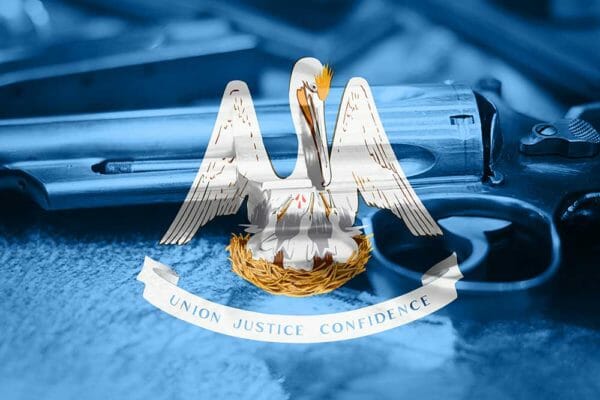
U.S.A. –-(AmmoLand.com)- Media sources in Louisiana are reporting Governor Bel Edwards has vetoed SB118, the Constitutional Carry bill, as he previously stated he would. From the advertiser.com:
Democratic Gov. John Bel Edwards has vetoed a bill to allow people to carry concealed handguns in Louisiana without a permit or training, which could fuel a growing movement for a veto-override session from the Republican-controlled Legislature.
The bill would restore the right to carry loaded handguns, openly or concealed to Louisiana. Louisiana was one of the first states to deny people the right to carry concealed weapons, in the early 1800s.
Slavery was common in Louisiana before it became a state, or part of U.S. territory with the Louisiana Purchase in 1803. Slavery continued there until the end of the Civil War. The prohibition on concealed carry was passed on 25 March, 1813, in the second session of the first state legislature. Kentucky passed a similar law earlier in 1813. The Kentucky law was later ruled to be unconstitutional in Bliss v. Commonwealth, in 1822.
There were no laws against concealed or open carry in the states or federal government before that time. It was not until the Supreme Court ruled the Bill of Rights did not apply to State governments, that bans on concealed carry became common, in the 1830s.
Now that Governor Edwards has vetoed Constitutional Carry, the question becomes whether there will be a veto session from July 20 to as late as July 24.
A veto session is scheduled; however, either house can cancel it by having a majority of legislators declare, in writing, they do not wish a veto session.
No veto session has been held since the 1974 Constitution was put in place. Two vetoes have been overridden, but they occurred when the legislature was in session.
Two-thirds of both houses are needed to override a veto in Louisiana. In the House, 70 votes are needed. In the Senate, 26 are needed.
It is possible that enough independents and Democrats would join with the Republicans to override a veto of Constitutional Carry in the House.
In the Senate, the Republicans should have enough votes. Some legislators are already pushing for the veto session to be held. They have to convince majorities in each house *not* to vote against a veto session.
The Republicans have strong majorities in both houses. If a veto session is rejected, it will be because enough Republicans joined with Democrats to reject it.
Constitutional Carry has been restored in 20 states, with the Texas law to go into effect on 1 September, 2021. Vermont has always had Constitutional Carry, since before it became a state, making 21 states which have a reasonable approximation of the state of law which existed when the Second Amendment was ratified in 1791. Most states with Constitutional Carry laws have small areas where carry is not allowed, such as prisons, parts of law enforcement facilities, some courtrooms, and private property where proper notice is given.
There are some states which prohibit carry without a permit in a small percentage of public areas, such as places that serve alcohol or even, surprisingly, churches!
It is almost certain more than 20 million adult citizens now have carry permits. 21 states have restored the right to carry without a permit in most public areas.
Incremental reforms will continue.
About Dean Weingarten:
Dean Weingarten has been a peace officer, a military officer, was on the University of Wisconsin Pistol Team for four years, and was first certified to teach firearms safety in 1973. He taught the Arizona concealed carry course for fifteen years until the goal of Constitutional Carry was attained. He has degrees in meteorology and mining engineering, and retired from the Department of Defense after a 30 year career in Army Research, Development, Testing, and Evaluation.

